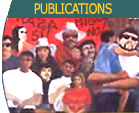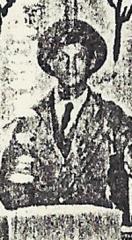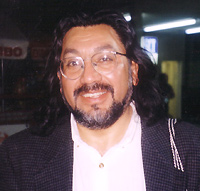000 Un lenguaje extraño ooooooPara mi primo Cornelio Córdova, de Chamisal, NM Hay gentes en este mundo, Primito, no me ha de creer Que al hombre le llaman Man, Y Woman a la mujer. 00 No sé dónde aprenderían Un lenguaje tan extraño, Pues al mes le llaman Month Y le llaman Year al año. […]
Entries Tagged as 'Poetry'
POESÍAS de José Inés García, “El Trobador Moderno”
by jigarcia
La gente de los girasoles
by mcotacardenas
Prefacio:
The principal narrator, Petra Leyva, is intrigued by Sebastián, a young Chicano academic who was born in Mexico but was raised in California. His father abandons him, his mother and other siblings by tricking them after bringing them to California from Mexico to live. His mother and his family work in the flower seed fields for a northern California company, including vast fields of sunflowers. Feeling the absence of his father, in later years he wonders as he is traveling through the streets of Michoacán whether he has passed his own father, half-brothers or sisters without knowing who they were. His cycle also explores being a Chicano gay or lesbian.
Petra elaborates the story of Jesús, a young Chicano activist who worked for the UFW and became close to César, the campesino leader. He and his best friend, Vickie Dee, were American-born, bilingual Chicano activists, who like Petra Leyva, learned about the farm-workers’ struggle and the goals of the Chicano Movement through their involvement with on-campus organizations for Mexican-American youth. Jesús and Vickie Dee differ in that in his case, his family at first did not always support his increasing activism. Vickie Dee, on the other hand, came from a family with grass-roots community involvement. Like Sebastián, Jesús and Vickie Dee are involved in the Chicano civil rights struggle.
More recently, at her sister Belita’s funeral, Petra Levya remembers other deaths of loved ones, including that of the young Jesús, and ponders the need to make several journeys which will ultimately enlighten the role of her own extended family in shaping her life’s direction. For instance, she felt compelled to help her adopted sister, Lupita, find her own Mexican natural family in the rural mountain region of Mexico. She considers that she shared much with these various young people besides the obvious interwined relationships and interests. She also shares with Sebastián a desire to know a mysterious half-brother whom her own father never acknowledged.
Without idealizing the rural campesino experience reflected in the narrators’ stories, the telling of the stories helps bring closure to their search for meaning and inspiration.
Puentes de tierra [selecciones]
by amartinezlacabe
DERECHO INTERNACIONAL Nacido en 1973, con derecho a televisión y sudadera de algodón. Hoy con derecho a levantarme temprano, si me da la gana, y pasearme bajo los puentes de Delhi entre otros nacidos en 1973, que duermen. sin derechos, sin televisión y sin sudaderas de algodón. DOWNLOAD THE PDF TO READ ALL THE POEMS […]
Nación Nómada
by rmedina
N a c i ó N o m a d i c N a t i o n ó m a d a Rubén Medina @ INDICE I. PUNTOS CARDINALES El mundo al instante Puntos cardinales Temascal Ombligo de la luna Partida de tres Case in point Chiqui Monte Albán Mujer-Niña Zócalo de Oaxaca Mensajes […]





 Site hosted and supported by the UC Merced Library
Site hosted and supported by the UC Merced Library